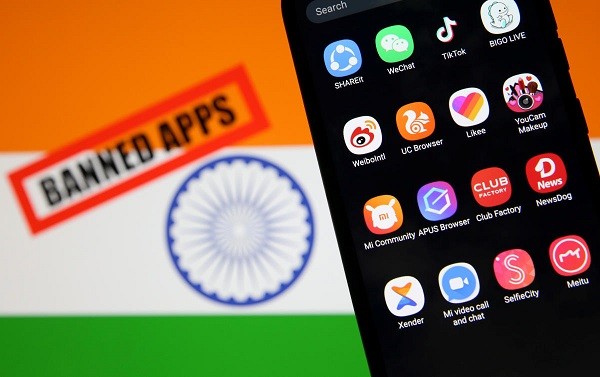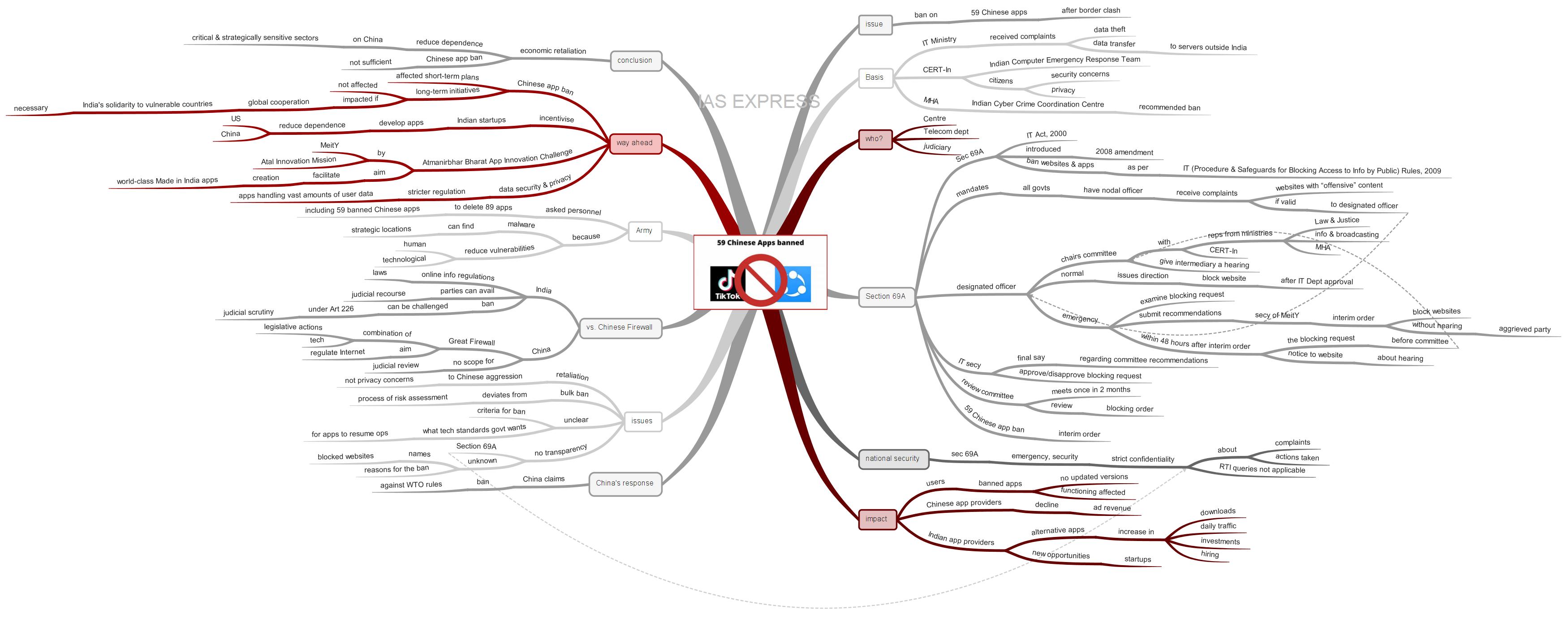India’s Ban on 59 Chinese Apps – Consequences and Way Ahead

From Current Affairs Notes for UPSC » Editorials & In-depths » This topic
IAS EXPRESS Vs UPSC Prelims 2024: 85+ questions reflected
The Indian government has banned 59 Chinese apps just two weeks after a violent border clash between India and China that led to the death of 20 Indian soldiers. Though the Indian government has not officially linked the app ban with the border dispute with China, public comments by government officials signify the same. Chinese app ban is one of the many economic retaliations of India in response to border dispute along the LAC. However, it has little impact on China’s influence in the India economy.
What is the basis for the ban?
- The Ministry of Electronics and Information Technology claimed that it had received numerous complaints regarding the misuse of the mobile apps for stealing and surreptitiously transmitting users’ data in an unauthorised manner to servers located outside India.
- It also stated that several citizens have reportedly raised concerns to the Indian Computer Emergency Response Team (CERT-In) pertaining to the security of data and privacy in using these apps.
- Ministry of Home Affairs’ Indian Cyber Crime Coordination Centre also recommended this ban.
- The ban of 59 apps is to safeguard the “sovereignty and integrity of India”.
- The government has invoked its powers under Section 69A of the Information Technology (IT) Act and the provisions of the IT (Procedure and Safeguards for Blocking of Access of Information by Public) Rules, 2009.
Who can block online information in India?
- Section 69A of the IT Act, 2000, was introduced by an amendment to the Act in 2008.
- It empowers the Centre to block public access to any online information – on both websites and mobile apps.
- It allows government ban on mobile apps or websites to protect India’s defence, sovereignty and integrity, friendly relations with foreign countries and public order with the due procedure under IT (Procedure and Safeguards for Blocking Access to Information by Public) Rules, 2009.
- Apart from this, the judiciary can also issue directions for blocking information online.
- The Department of Telecommunications can also issue orders to block online information to internet service providers to enforce licensing conditions.
What is the procedure followed under Section 69A?
- Section 69A mandates all ministries in central, state and union territory governments to have a nodal officer to receive complaints about websites that host “offensive” content.
- If the complaint is valid, the nodal officer can forward it to a designated officer, who chairs a committee to examine the grievances.
- The committee comprises of representatives from the ministries of Law and Justice, Home Affairs, Information and Broadcasting and the Indian Computer Emergency Response Team (CERT-In).
- This committee would give the intermediary a hearing.
- Under the ordinary circumstances, once this procedure is over, the designated officer issues directions to block the website, only after the approval of the IT Department.
- In case of emergency, Section 69A allows the designated officer to examine the blocking request and submit recommendations to the secretary of the Ministry of Electronics and Information Technology, who issues interim order to block the website without hearing the aggrieved party.
- The designated officer, within 48 hours of the interim order being passed, must bring the blocking request before the committee and issue a notice to the website asking its representatives to appear before the committee.
- The website is given at least 48 hours to prepare for the hearing.
- The IT secretary has the final say regarding the recommendations of the committee. He/she can approve or disapprove the blocking request and give directions to unblock the website.
- Section 69A also has a provision for a review committee, which meets once in 2 months to examine the blocking order, which may be set aside if the due procedure was not followed.
- The recent order to ban 59 Chinese apps is an interim one, which has been issued under the emergency clause. The app companies have been given an opportunity to appear and submit clarifications before the committee.
How is Section 69A used in the name of national security?
- Section 69A includes terms such as “security of the state, emergency nature, sovereignty and integrity of India and public order”, which is common in numerous other Indian laws.
- This clause mandates strict confidentiality about complaints and actions taken, making Right to Information queries not applicable to the law.
- It should be noted that the committee examining requests and reviewing appeals consists entirely of members from the executive. This reduces the credibility of the committee’s intentions.
- However, a 2015 Supreme Court justices upheld the validity of Section 69A and the existing blocking procedure, deeming it to be constitutional and is with sufficient safeguards.
What are the impacts of Chinese app ban in India?
On Users:
- While the installed apps may continue to exist on mobile devices, the users would not be able to download the updated versions of the same.
- If the government asks internet service providers to halt data flow from these apps, it could affect the further functioning of the installed apps.
On Chinese app providers:
- The Chinese app providers will face a decline in advertising revenue as most of these apps depend on the huge user-base from India.
On Indian app providers:
- Several Indian app providers who provide alternatives to popular Chinese apps like TikTok have witnessed an abrupt increase in the number of downloads after the ban
- They also saw a significant increase in daily traffic.
- There is an increase in investments to and hiring from domestic app companies.
- This is also giving opportunities for new startups in this field.
What is China’s response to the ban?
- The Chinese government stated that it suspected a violation of WTO rules by exploiting national security exceptions.
- This indicates the possibility of China filing a formal complaint at the WTO in the near future.
What are the issues with the ban?
Retaliation:
- The timing of the ban on 59 Chinese apps shows that the government is motivated less by privacy concerns than about sending a message to China amid the border tensions.
- It does not address the privacy issues emanating from the Chinese apps which may be influenced by China’s ulterior motives.
Internet war
- The app ban may be an economic retaliation to Chinese provocation in the LAC.
- Though this a reasonable endeavour, when compared with the military retaliation during this trying times, cutting off access to dozens of services in one fell swoop deviates from the process of risk assessment.
- India, in short, has turned its citizens’ access to information and outside world into a geopolitical game chip to be leveraged against another country.
Lack of clarity:
- The individual legal orders on the ban are going to remain confidential.
- Thus, there is no clarity regarding the criteria for the selection of 59 apps.
- In principle, the ban should be temporary until replaced by a set of regulations that spell out what steps that apps can take to reach compliance.
- It is not clear what sort of technical standards the Indian government wants to enforce so that the apps can continue to function after complying with government regulations.
Lack of transparency:
- Section 69A prohibits the revealing of information about complaints to block website and how they are dealt with.
- Thus, the names of the blocked websites are difficult to find.
- In the absence of public announcements, it is also hard to find the reasons for the ban on certain websites
How is India’s law to ban online information different from China’s Great Firewall?
- The Great Firewall of China is a combination of legislative actions and technologies enforced by the People’s Republic of China to regulate internet domestically.
- The Indian government too regulates online information using several laws at its disposal.
- However, in China, there is no scope for judicial review.
- In contrast, India gives aggrieved parties the right to avail judicial recourse.
- The Supreme Court clarified that the blocking orders can be challenged under Article 226 of the Indian Constitution. This allows for the judicial scrutiny of any process established by law.
- This is not the case in China.
Why did the Army recently ban apps?
- The Indian army has mandated its personnel to delete 89 apps from their mobile phones just days after the Indian government banned the 59 Chinese apps. These include Facebook, Instagram, PUBG, Zoom etc.
- A simple malware in a soldier’s smartphone can easily enable malicious players to find the country’s strategic locations and these apps pose this threat.
- Technologies always exploit vulnerabilities – both technological and human. Smartphone apps expose both the weaknesses at once
- India is not the first country to resort to a ban on certain apps.
- Several militaries across the world have undertaken similar measures against suspicious applications for the protection of sensitive information.
- Apart from app ban, countries like Turkey and Russia have banned the use of smartphones altogether at the forward posts.
- The Israeli army has launched an encrypted smartphone for its soldiers to enable them to send any information securely.
- Such measures have helped soldiers safeguard their information and escape vulnerabilities.
What can be the way forward?
- India’s ban on 59 Chinese apps, including the popular TikTok, opens up a new front in the economic retaliation measures against Chinese aggression.
- Though this may dent Chinese tech companies’ short-term plans, their long-term initiatives are not affected.
- The real impact of the action against 59 Chinese apps is when other countries reeling from Chinese hostility also follow suit.
- To turn the Indian government’s move into a global movement against Chinese technologies, with their questionable linkages to the Chinese government and security establishment, India should express global solidarity with such countries.
- Indian startups must be incentivised to develop domestic apps to reduce the country’s high dependence on the US or Chinese services.
- The recent “Atmanirbhar Bharat App Innovation Challenge” is a step in the right direction. It is an initiative of the Ministry of Electronics and Information Technology and Atal Innovation Mission that aims to facilitate techies and start-up community to create a world-class Made in India apps.
- As for data security and privacy, there is a need for stricter regulation of apps that handle vast amounts of user data.
Conclusion:
To ensure a strong economic retaliation, India must take steps to reduce dependence on Chinese products in several critical and strategically sensitive sectors. Banning Chinese-made apps barely scratches the surface of the core problem of Chinese aggression.
Practice question for mains:
The government’s ban on 59 Chinese apps brings in the vulnerability of internet freedom at a time of increased national security concerns. Comment. (250 words)
If you like this post, please share your feedback in the comments section below so that we will upload more posts like this.




